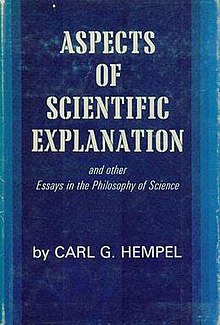 Cover of the first edition | |
| Author | Carl Gustav Hempel |
|---|---|
| Country | United States |
| Language | English |
| Subject | Philosophy of science |
| Published | 1965 |
| Media type | Print ( Hardcover and Paperback) |
| Pages | 504 |
| ISBN | 978-0029143407 |
Aspects of Scientific Explanation and other Essays in the Philosophy of Science is a 1965 book by the philosopher Carl Gustav Hempel. It is regarded as one of the most important works in the philosophy of science written after World War II.
Reception
The historian Peter Gay wrote that Aspects of Scientific Explanation was "seminal" and "indispensable", writing that Hempel persuasively argued that "the logic of history and that of the natural sciences are the same." [1] Gay observed that Hempel's essay "The Function of General Laws in History" is a "much debated classic". [2] The philosopher Michael Friedman described the book as one of the most important works in philosophy of science written after World War II. [3]
See also
References
Bibliography
- Books
- Friedman, Michael (2017). "Hempel, Carl G(ustav)". In Audi, Robert (ed.). The Cambridge Dictionary of Philosophy, Third Edition. Cambridge: Cambridge University Press. ISBN 978-1-107-64379-6.
- Gay, Peter (1976). Art and Act: On Causes in History – Manet, Gropius, Mondrian. New York: Harper & Row. ISBN 0-06-430061-7.
- Gay, Peter (1988). Style in History: Gibbon, Ranke, Macaulay, Burckhardt. New York: W. W. Norton & Company. ISBN 0-393-30558-9.
 Cover of the first edition | |
| Author | Carl Gustav Hempel |
|---|---|
| Country | United States |
| Language | English |
| Subject | Philosophy of science |
| Published | 1965 |
| Media type | Print ( Hardcover and Paperback) |
| Pages | 504 |
| ISBN | 978-0029143407 |
Aspects of Scientific Explanation and other Essays in the Philosophy of Science is a 1965 book by the philosopher Carl Gustav Hempel. It is regarded as one of the most important works in the philosophy of science written after World War II.
Reception
The historian Peter Gay wrote that Aspects of Scientific Explanation was "seminal" and "indispensable", writing that Hempel persuasively argued that "the logic of history and that of the natural sciences are the same." [1] Gay observed that Hempel's essay "The Function of General Laws in History" is a "much debated classic". [2] The philosopher Michael Friedman described the book as one of the most important works in philosophy of science written after World War II. [3]
See also
References
Bibliography
- Books
- Friedman, Michael (2017). "Hempel, Carl G(ustav)". In Audi, Robert (ed.). The Cambridge Dictionary of Philosophy, Third Edition. Cambridge: Cambridge University Press. ISBN 978-1-107-64379-6.
- Gay, Peter (1976). Art and Act: On Causes in History – Manet, Gropius, Mondrian. New York: Harper & Row. ISBN 0-06-430061-7.
- Gay, Peter (1988). Style in History: Gibbon, Ranke, Macaulay, Burckhardt. New York: W. W. Norton & Company. ISBN 0-393-30558-9.